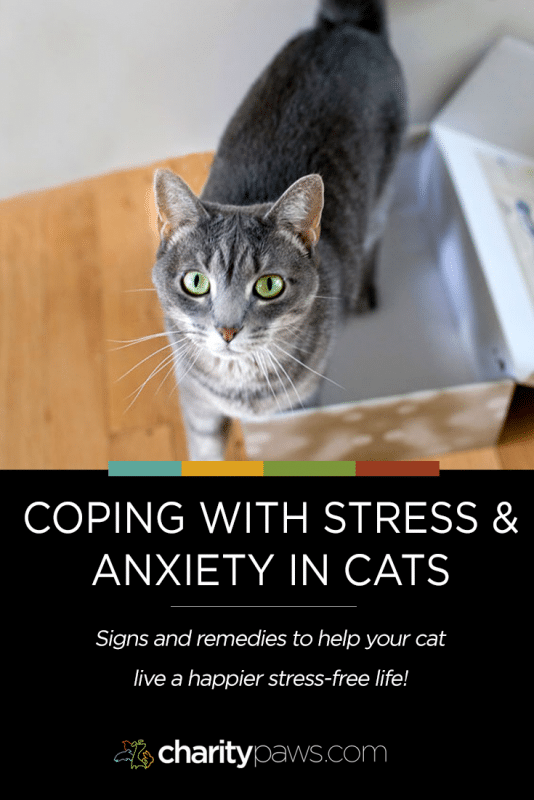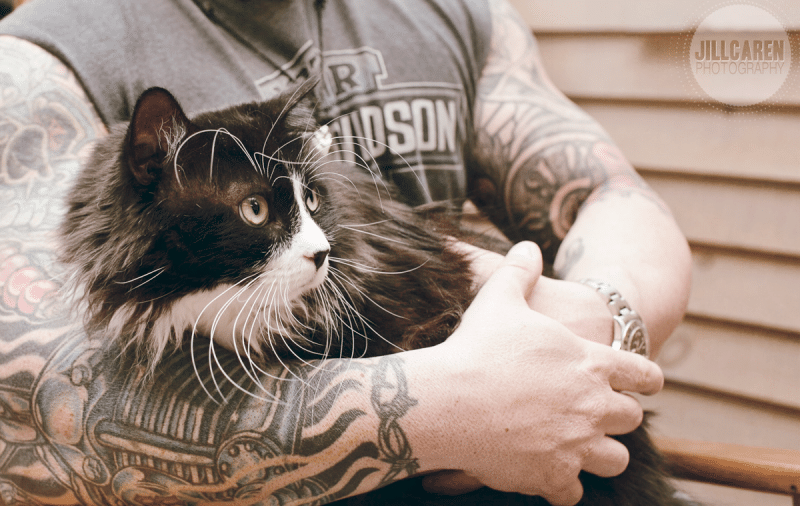
Our intent for this post is to help those that are dealing with newly adopted cats who may be struggling to acclimate in their new home.
Maybe they had a home before.
Maybe not.
Maybe they were abused in their past.
Maybe not.
Maybe they were at the shelter/rescue for months or years.
Maybe it was just a few days.
The cat you have adopted has a mysterious past that you may know nothing about which of course can affect their personality – whether for a short time or forever. This means it is extra important that you understand what to look for to make sure your cat is as happy and content as they can be.
If your cat is exhibiting signs of stress or anxiety, then this article is for you. From understanding their symptoms to evaluating options to help them – we hope you find an option here that can bring your cat some sweet relief from whatever stresses them!
Keep in mind they may even have an illness you are not aware of. There are even litters now that claim to detect certain issues cats may have which you can see in our pretty litter review. Making sure they are physically healthy should be done before addressing anything else!
What Is The Difference Between Stress & Anxiety?
Although they are similar – there are slight differences between stress and anxiety. Although the symptoms and treatments of both are very similar – it may be helpful to understand what they are to best help your cat.
Stress is more of a response to a threat in a situation a cat may be in. For example new home, new housemate or even a change in the food bowl location can cause some sensitive felines to become stressed. Basically there is a specific reason that we can validate that is causing the stress.
Anxiety is a fear or apprehension about an unknown situation. Most commonly pets will have separation anxiety which means they are anxious about what may happen when their owner leaves which will result in specific behaviors. Anxiety is often a little harder to manage since we may not always know what they are anxious about to be able to address it.
Signs Your Cat Is Stressed Or Anxious
It will be natural for your cat to feel stressed when you first bring them home. So many of the signs below you may see for a time after your adoption. But if the signs continue for too long and some of our suggestions below do not help – you may want to have medical intervention.
Remember, if you do not know their history – which is often the case, then stress is natural as they may be afraid and tired of so much change in their life.
Some of the signs you may notice include:
- Lack of appetite
- Hiding
- Aggression
- Not using litter box properly
- Diarrhea or constipation
- Excessive Scratching
- Sleeps more than usual
- Licking or biting themselves
- Trembling
- Destruction of items in the home
- More sever cases may show cats “panicking” and looking to escape a situation which can cause harm
Related: Cat whiskers falling out? Maybe it is stress!
Common Sources of Stress In Cats
- Not being neutered or spayed
- Stray animals outside the home that your cat can see or sense
- Inappropriate handling (holding too tight or pinning them down etc.)
- Unfamiliar people in the home
- New furniture or home decor
- Moving
- New baby
- New pets
- Bored or not mentally challenged
- Changes in routine (different working hours – kids home more etc.)
- Recently adopted into new home – not enough time to adjust before being handled and introduced to other pets
Adopted Cats Need Time To Adjust
Bringing your cat home is exciting – we get it! But remember, without knowing their history – you need to have patience with your addition!
When you get your cat home you should be prepared to allow a few weeks to adjust to your home. If you notice they are stressed or anxious from the day you bring them home, then you can try some of the below recommendations to help them feel more comfortable and secure in your home.
You can expect them to hide and be a little hissy for the first few days – and this is 100% NORMAL! Imagine being uprooted, defenseless and brought somewhere you have never been before – you might be afraid too.
Bringing Your Adopted Cat Home
- Let them get to know the home – but restrict them to one room for the first couple of days.
- Let them sniff and explore safely in that room – away from other pets and children.
- Show them where the litter box is and their food bowls.
- Spend time with them in that room – just lying on the floor will help them. While they may not acknowledge you – it will help them see you are the “good” in their life now.
- Let them know that they have all the time they need to feel comfortable and safe and that you will be there when they are ready to start bonding!
- Integrate other pets and children slowly – and be PATIENT. Not everyone will like each other right away, but they will learn to deal with each other on their own timeline. Keep dogs on leash or in a crate and let the cat sniff them. Do not allow the dog to chase a new cat – this can have really bad long term relationship effects. Do not let children hold cats unless they can do it safely.

Remedies For Cat Stress & Anxiety
There are a variety of remedies that may reduce or even remove the stress and/or anxiety your cat is feeling. Below are some of the best of the best based on reviews and feedback we found when doing research for this article.
We highly recommend only trying ONE of these remedies at a time so you know what is working and what is not. You should also always check with your veterinarian to ensure these remedies do not have any negative affects on any other medical issues your cat may have.
- 01. Rescue Remedy for Pets by Bach A homeopathic remedy that features 5 varieties of flowers including Star of Bethlehem – helps pets let go of past trauma, Rock Rose – helps alleviate panic or terror in stressful situations, Cherry Plum – helps with barking, scratching or licking, Impatiens – helps with impatient pets and Clematis – for pets that sleep to much.Simply add a few drops to their water or on a treat and you should begin to see results. The overall sentiment on this product is very positive and seems to have brought relief to many cats for a variety of stress related issues. From car rides to vet visits – stories are being posted on the great results Rescue Remedy brings.
- 02. VetriScience Composure MAX Liquid Composure MAX is a liquid that helps bring calmness to cats affected by the stress of travel, boarding, grooming and other environmental stressors. There are 3 main active ingredients including C3 Colostrum which is a calming complex that supports stress reduction, L-Theanine which assists in the production of amino acids to regain balance in certain neurotransmitters and B vitamins which helps the central nervous system.A 1/2 a teaspoon a day can make a big difference in the comfort of your pet. While not as popular as Rescue Remedy – the overall sentiment is positive for this product and many have reported success in the stress levels of their cats.
- 03. Comfort Zone Diffuser Kit I actually met with the team from Comfort Zone at a recent event and I do have to say I was impressed with their concern for our pets – and their want to have a premier product. I will be doing an in-depth review on this product soon!The Feliway Diffuser Kit was created to basically mimic the pheromones that a cat gives off to give them a sense of comfort. Basically it helps cats feel like they are in a safe space by emitting scents that let them know it is a cat friendly zone – so a sense of security and comfort then brings them to a happier place. It is a plugin diffuser that covers up to 650 square feet and will emit the scent throughout the space.It can take a few weeks to really see the effects – and Comfort Zone recommends you use it for at least 1 month. They offer a few different versions, one is for Multi Cat – which can help alleviate stress between cats, and the other is for single cats displaying aggressive behavior like scratching. There is some mixed sentiment about this product – but it is because of a change within the company which we will discuss further. Many have reported great results in their multi-cat households when the instructions were followed and the proper time was given.
- 04. Sentry Calming Collar for Cats Another product that focuses on the use of pheromone technology to help improve cat behaviors! The collar is meant to help with inappropriate marketing, increased meowing and scratching which are common stress activities in cats.Just like the diffuser above the pheromone that is released by the collar is meant to mimic the scent a mother cat produces – which in turn creates a calmness and comfort for the cat. This can be helpful during high stress situations like fireworks, storms, travel, vet visits and more.The collar can last up to 30 days and the effects can be immediate in most cats. The one downside we do see many reports of is that the collar does seem to stretch over time and when it does some cats have had it get stuck in their mouths. But these same reports also note that product does work. So it is important to ensure you keep an eye on the collar over time.
Other Ways To Help A Cat Showing Signs of Stress or Anxiety
- Make sure your cat is getting appropriate exercise – a game as simple as follow the feather or chasing a laser light can help promote a healthier mental state and release stress.
- If you know what the trigger for your cats’ stress or anxiety is – see how you can improve the environment. If you brought home a new pet or a baby – maybe move your cat to an area of the home where they can feel less stress with these new additions for a while.
- Take them for a full medical workup. Unfortunately, cats are not able to tell us when something is bother them – so get a veterinarian to check them out and make sure nothing physically is wrong. Something as simple as an tooth that has broken to a UTI infection can cause stress in even the most calm cat!
- Try relaxing music to create a comfortable relaxed environment for your cat. This can be especially useful if your normally friendly feline suffers separation anxiety! See the video below – and try not to become relaxed while watching it!
- If you have tried the above and your cat still shows signs of stress or anxiety it may be time to call in a professional behaviorist to see if they can help you find the trigger. Best Friends has a great article on how to find a great cat behaviorist!
Keeping Cats Engaged & Happy
Sometimes their stress could be as simple as being bored or not stimulated enough. Cats are known for their ability to be perfectly happy alone – but they are also known for their ability to chase. With that in their nature – sometimes more active cats may need a lot more stimulation to decrease their anxiety or stress.
Below are some popular options that others have tried and had success with in brining back some happy to their cat. Most are affordable – and if it does not work for your cat we re confident any shelter or rescue would appreciate the donation for their cats to use!
Final Thoughts
Personally we have a cat that is easily stressed. She was a rescue who was found walking the streets of a big inner city area so we understand her well. She loves to go outside – but stresses out when new people are in our home. She despises car rides and will hyperventilate when we even put her in her carrier. But we work with it to give her the best life we can! The snuggling and purring that she gives my daughter – well that makes it all worth it.
It is important to give your furry feline friend time to adjust and then carefully watch them to see what triggers their stress symptoms or anxiety.
Do you have an anxiety ridden cat or stressed cat? Have you found a solution to help them? We want to hear your stories!

